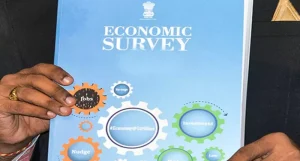Next month, Shubhanshu Shukla, an Indian astronaut, will embark on a space journey.
Indian astronaut Shubhanshu Shukla will travel to the International Space Station next month, 40 years after Rakesh Sharma's historic spaceflight on Russia's Soyuz spacecraft. Minister Jitendra Singh made the announcement after a review of the Department of Space's work.

New Delhi: According to Union Minister Jitendra Singh, Indian astronaut Shubhanshu Shukla is scheduled to embark on an Axiom-4 mission to the International Space Station next month. This is a significant event as it marks four decades since Rakesh Sharma's historic spaceflight on Russia's Soyuz spacecraft. Singh shared this update after a thorough review of the Department of Space and the Indian Space Research Organisation's recent progress in New Delhi.
Singh further elaborated that Shukla's journey is more than just a flight. It symbolizes India's bold step into a new era of space exploration. During the review, ISRO Chairman V Narayanan presented their upcoming space missions. One of these includes the launch of the NISAR satellite, developed jointly with NASA, in June aboard the GSLV-Mark 2 rocket. Additionally, in July, the space agency is set to put into orbit the BlueBird Block-2 satellites of US-based AST SpaceMobile Inc. using the heavy-lift LVM-3 rocket.
The minister highlighted that Shukla's mission, planned for May, is a significant milestone in India's expanding international space collaborations. Shukla, a decorated test pilot with the Indian Air Force, was selected under ISRO's Human Spaceflight Program and is among the top contenders for the Gaganyaan mission. His participation in the Axiom-4 mission is expected to provide crucial hands-on experience in spaceflight operations, launch protocols, microgravity adaptation, and emergency preparedness, all of which are essential for India's crewed space ambitions, as stated by an official statement.
The statement further emphasized that what sets Shukla's mission apart is its strategic importance. Unlike the symbolic undertones of India's first human spaceflight, this time the focus is on operational readiness and global integration. Shukla's participation also highlights India's growing engagement with public-private international partnerships in space and its determination to emerge as a serious contender in human space exploration.
Singh also noted that the collaboration with international partners and the strategic momentum of projects like Gaganyaan reflect India's commitment to becoming a global leader in space technology. He added that these efforts not only have a scientific purpose but also align with the vision of a developed and self-reliant India.
ISRO has planned the launch of the PSLV-C61 mission carrying the EOS-09 satellite, equipped with a C-band synthetic aperture radar. This technology can capture high-resolution images of Earth's surface under all weather conditions, be it day or night. Another significant event in the pipeline is the Test Vehicle-D2 mission, designed to simulate an abort scenario and showcase the Gaganyaan Crew Escape System. This mission also includes sea recovery operations for the Crew Module, mimicking the procedures planned for India's first human spaceflight, Singh mentioned.






